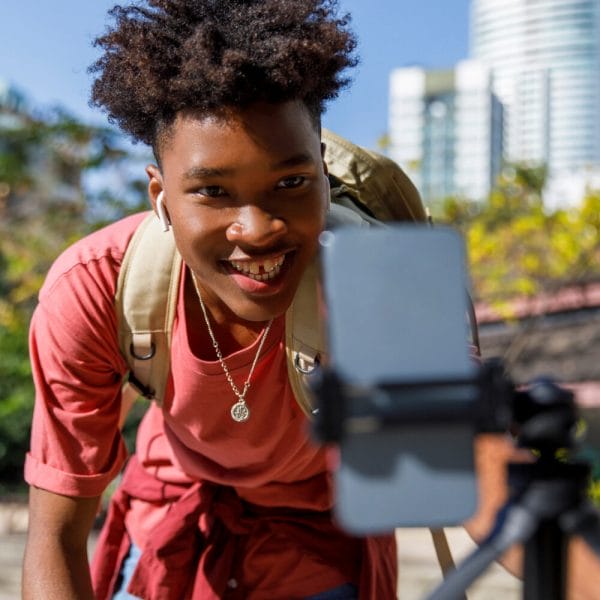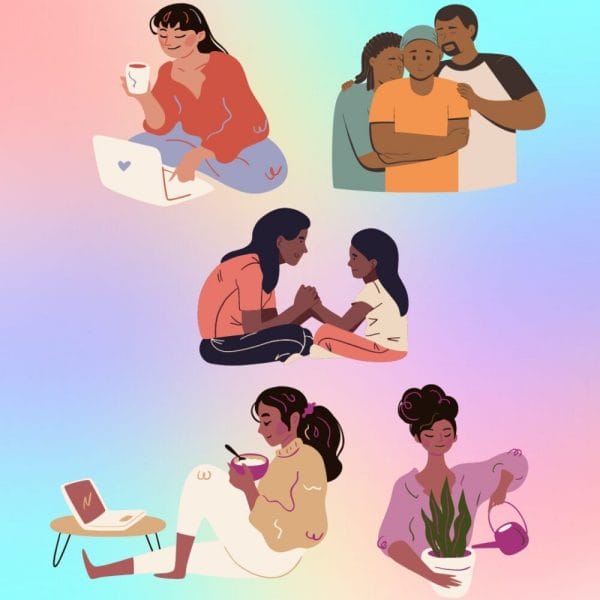In the past 10 years, I have dedicated my career as a psychologist and researcher to studying the pivotal role of racial socialization in identity formation, particularly during the formative adolescent years. When anti-Blackness is so deeply rooted in our history, systems, and mainstream media, positive messages emanating from schools, caregivers, and parents are tremendous in molding young people’s perception of self. A robust sense of self-identity can significantly influence Black youth mental health.
Last summer, I took my research outside academia and joined Hopelab as a Health Equity Fellow. I used this opportunity to leverage what I know — spanning racial identity, racial socialization, school racial climate, school engagement, and social-emotional learning — to interrogate how we can collectively create meaningful impacts on the material conditions of young people’s well-being. This week, I’m thrilled to invite HBCU researchers to join me in the journey to a brighter, more brilliant future for Black youth mental health and well-being.
My identity enriches my curiosities and inquiries
As a cis-gendered Black woman navigating the complexities of identity, I’ve often thought about balancing acknowledgment of oppression with celebrating the richness of my experiences. During childhood and adolescence, I was fortunate to have a supportive familial environment that nurtured my curiosity and encouraged me to explore the world with a sense of wonder and possibility. I had the opportunity to dream. I was encouraged to be proud of my Blackness — from the melanin in my skin to the texture of my hair — I loved me! And though interpersonal and systemic racism was present, my family taught me to resist it.
As an early career scholar, my research program focused on the impacts of oppressive experiences — like racism, discrimination in school, and more — on Black youths’ well-being. It’s been fulfilling to contribute to a robust body of research literature that provides empirical evidence for what we, Black people, already know: Anti-Black racism is harmful to our schooling experiences and well-being.
During my transition to mid-career status, I’ve noticed a shift in my perspective — a desire to reclaim the narrative from one that limits Black people as simply responders to oppression to one of empowerment. Yes, we are well aware of the systemic barriers and injustices that continue to plague our society, but we refuse to be defined solely by them. Instead, I choose to focus on the remarkable brilliance, strength, and spirit that have defined us. This is our essence!
As I seek to translate my research to directly impact the lives of those who share my identity, I am constantly reminded of the incredible resilience of my community and of our ability to rise and thrive. And I am hopeful for the future, a future where we are free to fully embrace the richness of our identities, unencumbered by the chains of oppression.
Empowering Black researchers at HBCUs
The positive affirmations I received from my family provided a foundation of self-confidence and resilience that has guided me throughout my life. Now, as a faculty member at an HBCU, I am committed to ensuring that all Black youth have access to the same empowering experiences.
Despite not attending an HBCU myself, I am now a proud member of the faculty at one. Why? Because I truly believe that these institutions can serve as the blueprint for community-driven solutions and life-changing relationships. However, I also recognize (and experience) the fact that HBCU faculty are often overlooked when it comes to strategic opportunities and decision-making processes. This lack of representation not only undermines the potential of HBCUs but also perpetuates systemic inequalities within academia. This disparity must be addressed.
I am thrilled to be part of designing Hopelab’s HBCU fellowship — a program that aims to accelerate translational science and empower Black researchers at HBCUs. As a former translational science fellow at Hopelab, I’ve increased my capacity for supporting, through my research, a future where Black youth can access the superpower of their cultural assets early in life and be empowered to thrive.
By joining the HBCU Translational Science Fellowship, you will have the chance to:
- Engage in cutting-edge research that addresses the unique needs and challenges facing Black youth.
- Collaborate with fellow HBCU faculty members and experts in the field of translational science.
- Access resources and support to enhance your research program and advance your career.
- Make a tangible difference in the lives of Black youth and communities across the country.
Participating in the fellowship and now serving as a Hopelab consultant for the inaugural HBCU Translational Science fellowship is an incredibly impactful experience for me personally and professionally. It enhanced my research program and provided invaluable networking opportunities by connecting me with people from policy, behavioral health tech, social innovation, and youth programming sectors. This expansion of a traditional sphere in academia has allowed me to further develop my skills as a mentor and advocate for Black researchers.




